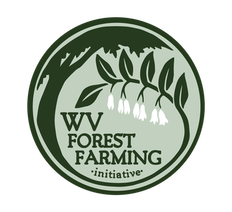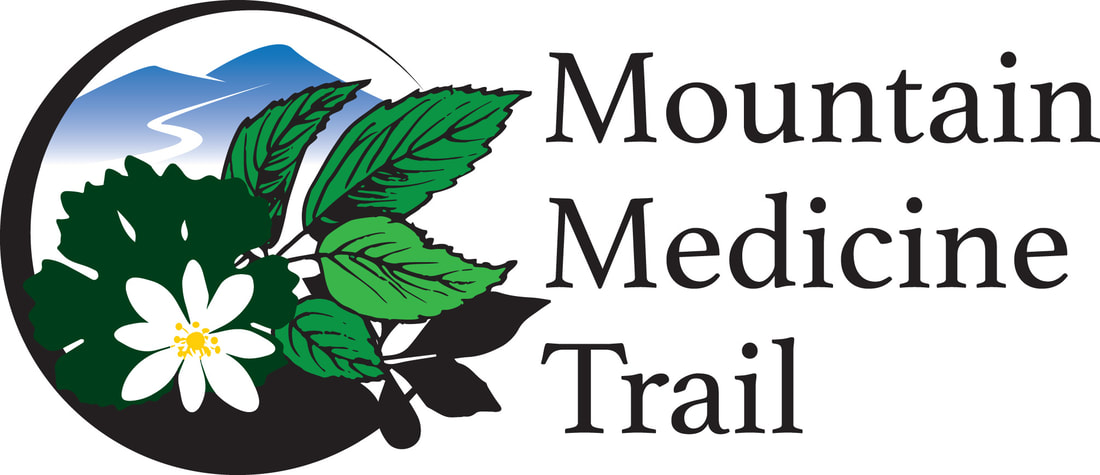The Mountain Medicine Trail (MMT) is a collection of destinations throughout Pocahontas, Randolph, and Tucker Counties in West Virginia that celebrate the woodland plants native to our West Virginia forests (also known as Appalachian forest botanicals). Destinations on the MMT offer visitors an opportunity to deepen their understanding of the cultural relevance and the economic and historical significance of Appalachian forest botanicals, and rich ecology of our forest ecosystems.
The MMT also highlights the work of local farmers who are cultivating Appalachian forest botanicals as a way to generate income from forested land and reduce the harvesting pressure on wild plant populations. Stops on the trail include retail locations offering herbal and other products from WV producers, lodging destinations, and sites for educational or recreational opportunities.
The MMT also highlights the work of local farmers who are cultivating Appalachian forest botanicals as a way to generate income from forested land and reduce the harvesting pressure on wild plant populations. Stops on the trail include retail locations offering herbal and other products from WV producers, lodging destinations, and sites for educational or recreational opportunities.
The Mountain Medicine Trail is an extension of the work of the West Virginia Forest Farming Initiative (WVFFI), intended to support West Virginia's non-timber forest product (NTFP) economy by building connections and growing opportunities for forest farms and other businesses to engage with the state's expanding tourism economy. Through this project we hope to educate the public about the uses and sustainability concerns for Appalachian forest botanicals, support the small producers and related businesses who are supplying our region with locally sourced forest botanicals, and raise revenue from tourism in rural communities.
The MMT is a project of the Yew Mountain Center and Future Generations University and is supported by a USDA Rural Business Development Grant.
The MMT is a project of the Yew Mountain Center and Future Generations University and is supported by a USDA Rural Business Development Grant.
A Work in Process
Please bear with us as this project grows and we add destinations and details regarding what each stop on the trail will be offering!
Please bear with us as this project grows and we add destinations and details regarding what each stop on the trail will be offering!
What is Mountain Medicine?
We think of mountain medicine as an important component of our state’s history and our future.
Mountain medicine commonly refers to the herbal and folk traditions of our region. The forests of Appalachia have long been a resource for plants prepared as food and medicine - plants including ramps, ginseng, goldenseal, and black cohosh, among many others. For centuries, people have collected and used medicinal plants from the Appalachian forests. It is a practice that continues to this day in West Virginia, and we want to acknowledge the immense value of our forest pharmacy to those who call the these mountains their home. We also believe it’s important to recognize West Virginia's contributions supplying forest medicinals to meet the global demand for herbal products.
In addition to the above definition of mountain medicine, we also think of these mountains as medicine. Healthy forest ecosystems provide immense ecological benefits and offer opportunities for us to enjoy connection, relaxation, and recreation.
Mountain medicine commonly refers to the herbal and folk traditions of our region. The forests of Appalachia have long been a resource for plants prepared as food and medicine - plants including ramps, ginseng, goldenseal, and black cohosh, among many others. For centuries, people have collected and used medicinal plants from the Appalachian forests. It is a practice that continues to this day in West Virginia, and we want to acknowledge the immense value of our forest pharmacy to those who call the these mountains their home. We also believe it’s important to recognize West Virginia's contributions supplying forest medicinals to meet the global demand for herbal products.
In addition to the above definition of mountain medicine, we also think of these mountains as medicine. Healthy forest ecosystems provide immense ecological benefits and offer opportunities for us to enjoy connection, relaxation, and recreation.
Preserving Appalachian Forest Botanicals
As consumer demand for herbal products grows so does the demand for medicinal herbs from our West Virginia forests. Combined with declines in native forest habitat, there are concerns around depleting populations of our native forest herbs. Many of our most valuable forest medicinals are currently considered at-risk according to the medicinal plant conservation organization, United Plant Savers.
The Mountain Medicine Trail supports local forest farmers who are cultivating forest medicinals as a way to reduce the demand for harvesting from wild populations. We are committed to advocating for responsibly sourcing native medicinal plants as part of a future-focused effort to continue to meet global demand for these products in a manner that encourages the healthy growth and maintenance of our forest ecosystems. We also believe the cultivation of forest medicinals by West Virginia landowners can support a renewable economy centered around the production of non-timber forest products (NTFPs) that provides meaningful income opportunities to rural landowners.
The Mountain Medicine Trail supports local forest farmers who are cultivating forest medicinals as a way to reduce the demand for harvesting from wild populations. We are committed to advocating for responsibly sourcing native medicinal plants as part of a future-focused effort to continue to meet global demand for these products in a manner that encourages the healthy growth and maintenance of our forest ecosystems. We also believe the cultivation of forest medicinals by West Virginia landowners can support a renewable economy centered around the production of non-timber forest products (NTFPs) that provides meaningful income opportunities to rural landowners.
What are NTFPs? What is Forest Farming?
Non-Timber Forest Products, or NTFPs, are crops that are harvested from forests. In addition to medicinal plants, these crops include edible and decorative plants, mushrooms, tree saps, and honey from bees that forage on trees. NTFPs are also the raw materials for a number of value added products including teas, tinctures, salves, oils, wreaths, syrups, and baskets.
Forest Farming refers to the practice of intentionally and sustainably cultivating edible, medicinal, and other NTFPs under a forest canopy. Forest farming is an opportunity for landowners to generate income opportunities on forested property without logging. Forest farming is also a land stewardship practice that enhances the ability of the forest to perform essential environmental services such as regulating the watershed and sequestering carbon.
Forest Farming refers to the practice of intentionally and sustainably cultivating edible, medicinal, and other NTFPs under a forest canopy. Forest farming is an opportunity for landowners to generate income opportunities on forested property without logging. Forest farming is also a land stewardship practice that enhances the ability of the forest to perform essential environmental services such as regulating the watershed and sequestering carbon.


